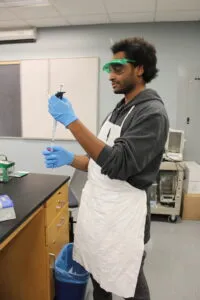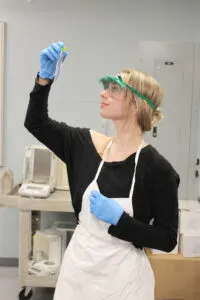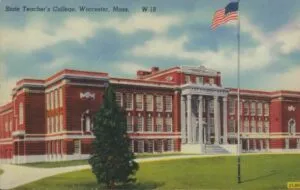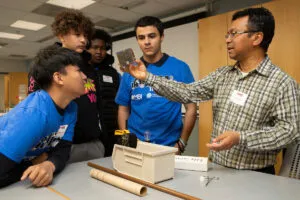Educating Scientists
As biotech industry grows in Massachusetts, Worcester State’s biotechnology program recognized as a best value in New England and a Top 10 best biotechnology degree in the U.S.
Goggles, gloves, and aprons on. Grab a 15 mL tube with the green cap. Don’t forget to label everything. The first few minutes of Associate Professor Roger Greenwell’s biotechnology lab are a flurry of set-up, instruction, and organization.
The assignment for today: protein purification. Teams of undergrad and grad students gather around their lab stations as Greenwell leads them step by step through two hours of hands-on lab work—answering questions, troubleshooting, and testing their knowledge. The camaraderie, teamwork, and thoughtful conversations suggest the students also enjoy the work—which might not be the point—but it certainly bodes well for their future as scientists.
“We have a very busy afternoon,” Greenwell announces. “I don’t want anyone to graduate from here without having run a protein gel.”
For those students who want to land a job in biotechnology, this lab training is essential. And such jobs are in high demand—locally and across the state.
By 2024, Massachusetts will need to fill more than 40,000 jobs in life sciences—many of them in the state’s growing biotechnology sector. In Worcester alone, there was a nearly 20 percent increase in research and development jobs between 2020 and 2021, according to the Mass Biotechnology Council, and the average salary for industry employees in the city topped $122,000.
In 2022, Worcester had 389,000 square feet of new biotech facilities under construction, space that will be filled with a combination of biotech/biomed startups and global biotech companies that are expanding research, manufacturing, and operations in Central Massachusetts. Many are eager to hire college graduates with strong lab skills, basic science knowledge, and an interest in pushing the frontiers of discovery.
Worcester State University is providing a clear pathway to these opportunities with its interdisciplinary biotechnology program in the School of Science, Technology, and Health. Combining biological and chemical sciences, and tapping into summer research opportunities in the university’s Aisiku STEM Center, the program offers baccalaureate and master’s degrees, as well as a 4+1 accelerated dual bachelor’s-master’s degree program.
In 2022, the program garnered recognition for its combination of small class sizes and mentoring, rigorous hands-on laboratory training, affordability, and value. College Factual ranked Worcester State the #1 best value undergraduate biotech program in New England in 2022, and College Choice ranked the program among its Top 10 Biotechnology Degrees in the U.S., along with schools like UC Davis, Purdue, and the University of Georgia.
“We prepare our students with the skills and the knowledge, so when they get to the industry, they can quickly hit the ground running,” said Associate Professor of Chemistry Weichu (Brian) Xu, who co-leads the program with Greenwell and worked at GL Synthesis in the Massachusetts Biotech Research Park in Worcester before joining the faculty. “We definitely see the opportunities in Central Massachusetts with the biotech industry—new buildings and expanded programs—a lot is happening.”

Biotechnology major Aman Johnson ’23 works on protein purification in lab class. (Photo by Nancy Sheehan)
Along with laboratory training, faculty in the biotechnology program have focused on building partnerships with industry leaders. In 2019, the program established an industry advisory board made up of biotech leaders, some of them graduates of Worcester State. By keeping pace with a fast-evolving industry, faculty continually improve the curriculum, establish research and equipment-sharing collaborations, and develop internship opportunities for students.
Most recently, the university’s science labs are being outfitted with new, industry-relevant equipment to ensure students have hands-on laboratory skills that are in greatest demand by employers. Read more about the $658,000 grant from the Baker-Polito Administration and the Massachusetts Life Sciences Center.
“One of the things Worcester State does really well is they have a great team that is flexible and creative and really tries to prioritize industry partnership,” said Jon Weaver, president and CEO of Massachusetts Biomedical Initiatives (MBI), which works across academia, business, and government to promote the startup of biomedical companies throughout the state.
In 2022, CBRE, a global commercial real estate company, analyzed the country’s top 74 life sciences labor markets, evaluating both occupational and educational data. Boston/Cambridge and San Francisco were the largest clusters—and Worcester ranked #15, right behind Houston and Atlanta. Together, that means Massachusetts is the place in the world to do biotech research, Weaver said.
“Every major biotech company is represented in Boston and Cambridge,” Weaver said. “Being that close to Boston and Cambridge requires a regional strategy, and Worcester is an important part of that regional strategy. A lot of that is tied to Worcester producing really great talent. There’s a whole vital ecosystem that comes with having a good percentage of colleges in your community, and Worcester is blessed with that.”
In a 2022 survey, the university found that 79 percent of Worcester State biotech alumni from the past three years are working in the industry, and 20 percent were in graduate school—a remarkable track record for any program.
Read more about biotechnology alumni Samantha Durand MS ’22 and Nicolas Esper ’20, who are both working at Massachusetts biotech firms.
“Our students, who are graduating with a strong foundation in biologic and biotech sciences, are getting cherry picked from one job to the next,” said Biology Professor Daron Barnard, who leads the university’s Aisiku STEM Center. “We see them getting hired away and going into top companies. Our 4+1 biotech master’s has been an incredible boon for our students.”

Emily Griffin works on protein purification. (Photo by Nancy Sheehan)
The MS in biotechnology program—designed to be completed in the evening—often attracts individuals already working in biotech who want to further their skills and knowledge. Fitchburg State biology graduate Grace Kim had been working in quality control at Bristol Myers Squibb (BMS) for five years when she decided she wanted a master’s degree.
“What was happening at work was they were bringing on a lot of technology, and because I was a general biology major without a focus on biotech, there were gaps in my understanding,” Kim said. “I was getting curious about other things. Worcester State was affordable, and it was close by. The schedule of the program was flexible, so I could go to school at night while I worked during the day. Worcester State was offering a lot of classes that hadn’t been available to me, and those classes were part of my day-to-day work at BMS. Meeting other students who were also out in the field working at different companies was helpful—that’s not something I expected.”
After finishing her MS at Worcester State in 2017, Kim was able to move into a new role at Bristol Myers as a microbiologist in Process Microbiology, a global unit that oversees control strategies in the manufacturing process of drugs. She now serves on the biotechnology program’s advisory board, providing insight to the university about how her education translated in her work at BMS.
For Greenwell, who teaches many of the biotech classes, knows every student in the program, and keeps in touch with many of them after they graduate, the vision is to establish Worcester State’s biotechnology program as the premiere public undergraduate institution for biotechnology and to work closely with and integrate support from our local biotechnology industrial partners.
Top image: Associate Professor Roger Greenwell teaches students in his biotechnology lab how to do protein purification. From left are: Daniel Clark, Benjamin Bui, Sheila Badu, Roger Greenwell, Aman Johnson, Kya Perez (white sweater) and Emily Griffin.



